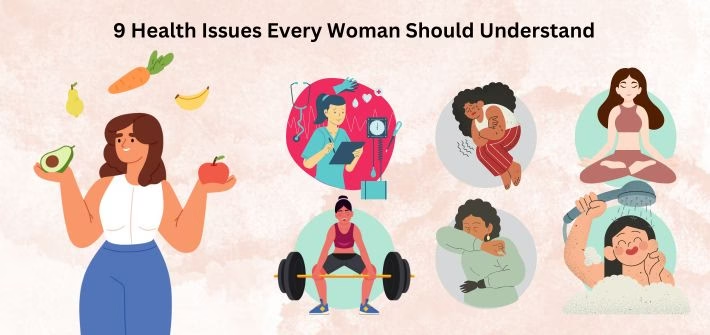Women’s bodies go through many unique changes throughout life—from puberty to pregnancy to menopause. Along the way, there are some health issues every woman needs to know about, not only for knowledge, but for prevention, early detection, and better self-care. Whether you are in your 20s or 60s, these are common health issues you should know about to help you make the right decisions about your health.
Here are 9 vital health issues all women need to know about—in simple language and with genuine tips.
1. Heart Disease: The #1 Killer
Many people think heart disease is a “man’s problem,” but it kills more women than men. Symptoms in women might be different from men—like nausea, shortness of breath, or fatigue instead of chest discomfort.
What to do:
- Eat heart-healthy foods
- Stay active
- Don’t ignore symptoms like persistent fatigue or chest pain
- Get your blood pressure and cholesterol level checked regularly
2. Breast Cancer: Know Your Normal
Breast cancer is the most publicized women’s health issue—and deservedly so. It’s common, but if caught early, it can be salvaged.
What to do:
- Do regular breast self-exams
- Know your normal body
- Get routine mammograms at 40 (or earlier if you have a family history)
- Talk to your doctor if you ever experience lumps, skin changes, or discharge
3. Reproductive Health: It’s More Than Menstruation and Pregnancy
Your reproductive health includes your cycle, fertility, and conditions like PCOS, endometriosis, and fibroids. These can cause pain, heavy bleeding, or infertility—and they’re regularly misunderstood or underdiagnosed.
What to do:
- Track your periods and symptoms
- See a gynecologist on a regular basis
- Don’t ignore pelvic pain or irregular cycles
- Ask questions about your decisions—there are treatments
4. Osteoporosis: Bone Health Matters
As women age—especially after menopause—bone loss is a concern. Osteoporosis may lead to brittle bones and serious fractures.
What to do:
- Get sufficient calcium and vitamin D
- Exercise with weight-bearing exercise like walking or strength training
- Do not smoke and limit alcohol
- Ask your physician about a bone density test after menopause
5. Depression and Anxiety: Mental Health is Health
Women are nearly twice as likely as men to experience depression and anxiety. Hormones, stress, and life changes (like childbirth or menopause) can all play a role.
What to do:
- Pay attention to your mood and sleep
- Talk to someone if you’re feeling overwhelmed or hopeless
- Therapy, support groups, and medication can help
- Make time for rest, hobbies, and self-care
6. Autoimmune Disorders: When the Body Attacks Itself
Autoimmune illnesses—like lupus, rheumatoid arthritis, and Hashimoto’s thyroiditis—are more common in women. These illnesses cause the immune system to assault healthy cells by error.
What to do:
- Watch for signs and symptoms like pain in the joints, fatigue, or weight change without explanation
- Get blood tests if something doesn’t feel “right”
- See specialists to manage symptoms and flare-ups
- Be in the know—it can take a little while to get an accurate diagnosis
7. Diabetes: The Silent Danger
Type 2 diabetes is on the rise among women, in part because of sedentary lifestyles and diets. Diabetes affects anything from fertility to heart health if left untreated.
What to do:
- Maintain a well-balanced diet with reduced processed sugar
- Stay within a healthy weight
- Exercise on a regular basis
- Get your blood sugar checked, especially if there is family history or gestational diabetes
8. Cervical Cancer: An Avoidable Threat
Thanks to Pap smears and the HPV vaccine, cervical cancer is highly preventable. Still, regular checkups are essential.
What to do:
- Get a Pap test every 3 years (or as recommended by your doctor)
- Get the HPV vaccine if you’re eligible (it’s now available up to age 45 in some places)
- Use protection during sex to reduce HPV transmission
- Don’t skip your gynecological appointments
9. Menopause: More Than Just Hot Flashes
Menopause is a natural life stage, but the symptoms—hot flashes, mood swings, sleep problems—can be tough. It can also affect heart and bone health.
What to do:
- Talk to your doctor about symptom relief (HRT, lifestyle changes, etc.)
- Stay active and eat well
- Get regular health screenings for bones, heart, and cholesterol
- Know you’re not alone—support groups and information can help
Final Thoughts
Health is not about repair—it’s about understanding your body, paying attention to what’s out of the ordinary, and acting early. All of these nine conditions affect millions of women, but with knowledge and prevention through regular checkups, most can be prevented or managed.
Listen to your body. Ask questions. Look for a Women’s Health Clinic near me. Prioritize your well-being—not only for you, but for the people who love and depend on you. Because when women are healthy, families and communities prosper too.

